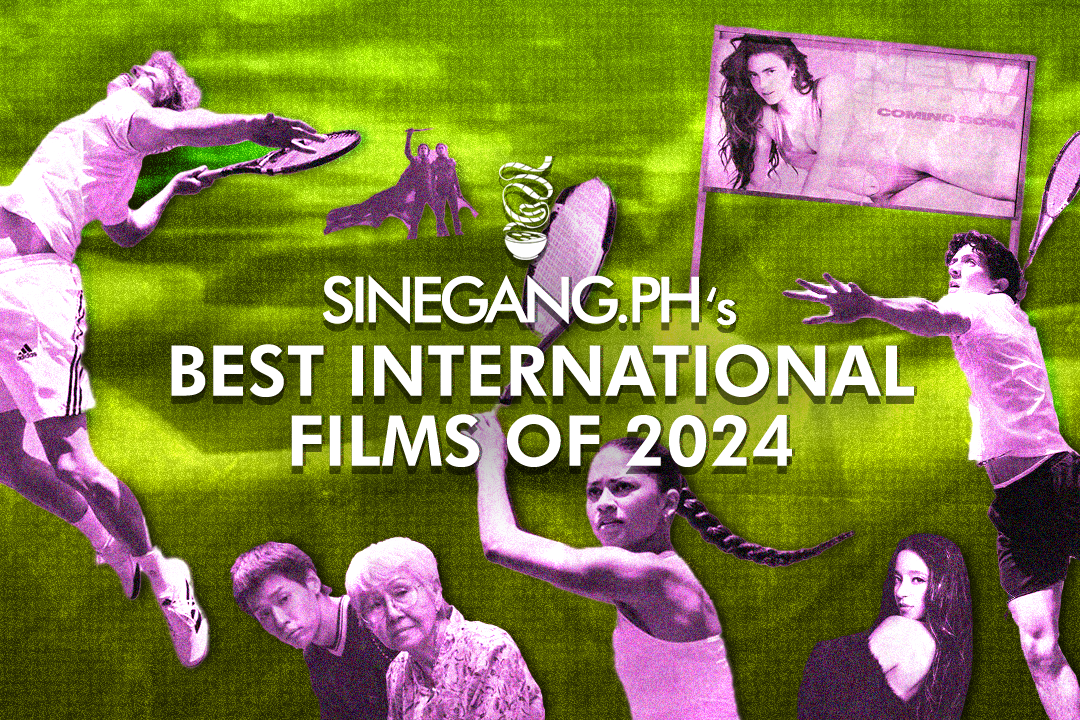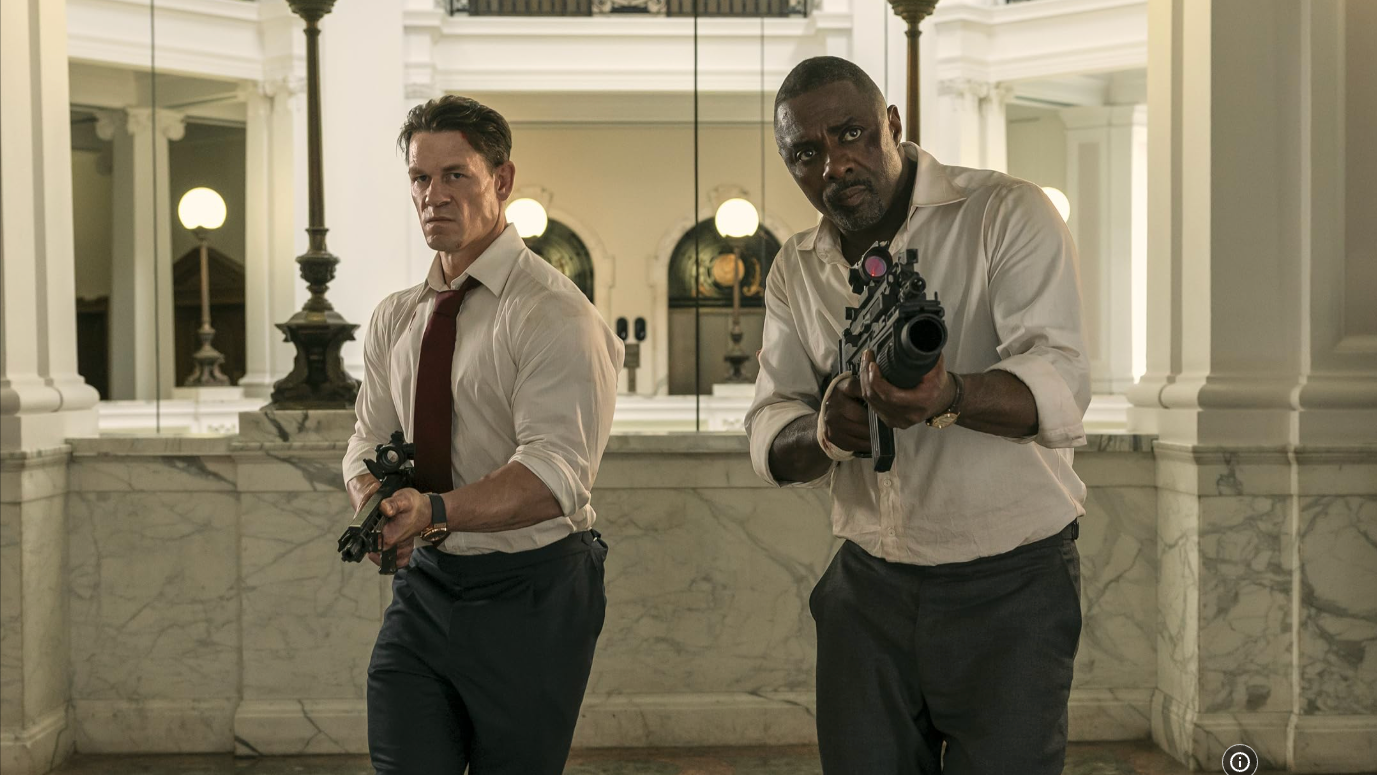SINEGANG.ph's Best International Films of 2024
SINEGANG.ph’s Best International Films of 2024
Feature art by Joaquin Prudente
One of the great topics that dominated cinephilia conversations (i.e. Film Twitter) in 2024 is access. The access to movies that audiences want to watch, the access to movies made by homegrown filmmakers, and the access to uncut versions.
Someone wiser would tell you there are geopolitics at play. Upon closer look, it’s the country’s regulatory board that’s actually faltering. But the bottomline is movies—cinema—are increasingly becoming more global-focused; moviegoers and cinephiles are everywhere now. We want to watch your movie.
In the Philippines, a third world nation, access to Hollywood blockbusters and festival gems are decided by local distributors and lately the government. Most of the time they do a good job. Until they don’t, and we resort to our suki shops.
We are privileged to have witnessed—and have access to—some of global cinema’s best films of the year. Half of our list came from Asian countries (that’s on Asian excellence). Innovative franchises received their flowers. And we honored Hayao Miyazaki’s “retirement” movie.
Also, a note: for this list, we decided to only include films that had official releases in the Philippines in 2024. That includes a theatrical, festival, or streaming release.
Without further ado, here are SINEGANG.ph's best international films of 2024, listed alphabetically.
Kani Kusruti (center) in ‘All We Imagine as Light’
All We Imagine as Light
Dir. Payal Kapadia
Two Mumbai nurses and a hospital cook are at different stages in life: young Anu tries to nurture a secret relationship with the Muslim Shiaz; widowed Parvaty is threatened with eviction after her husband failed to give her the documents proving her residency; and Prabha, married legally to a man she hasn’t seen since her wedding and might as well be single. Rocked by a vague gesture of love from that man in the form of an unmarked German air fryer, Prabha’s yearnings and longings come to the surface and start to change her.
All We Imagine as Light is a simple story, but its profound wisdom comes from how Payal Kapadia weaves the sights and stories of lower-income living in Mumbai. It's through this context that makes the film’s big-city loneliness ring deeper and its ultimately hopeful look at love feel all the more special in a world that increasingly demands we have to be worth something to be worthy of love. All We Imagine as Light will stand the test of time—the way it stood the Film Federation of India’s decision to overlook the Cannes Grand Prix winner as their country’s Oscar submission. It's as powerful as a cinematic statement in believing in the human capacity for love. – Philéo Victor Ko
Read our full review: ‘All We Imagine as Light’ REVIEW: Different Kinds of Love in Vivid Display
Mikey Madison in ‘Anora’
Anora
Dir. Sean Baker
Before meeting Vanya, the adrenaline junkie and spoiled manchild of a Russian oligarch—whose presence causes Sean Baker's 2024 Palme d'Or-winning Anora to teeter between bustling energy and dreadful melancholy—Ani, the titular heroine, eats her dinner out of a Tupperware in the locker room. It's a scene that powerfully contrasts with the film's opening moments, where we see her life as a sex worker in a Manhattan strip club, working nights and sleeping during the day. Moments like this are scattered throughout Anora—the piercing, evaporative silences where the noise recedes, allowing Baker's “modern fairytale to shift from a highly infectious and stylish screwball romp to a convincing look at class solidarity, fragile taboo, and the strict categories we place on others. Such sensitivities make the film an experience that is as nail-bitingly fun as it is heartbreaking and confrontational, making your eyes peel from scene to scene. And beneath it all is Mikey Madison, whose performance is undoubtedly at the forefront of the greatest achievements of cinema in a year of creative transgressions and challenges to brittle social roles and values. – Joshua Jude Ubalde
Read our full review: ‘Anora’ REVIEW: A Cinderella fairytale like no other
Still from ‘The Boy and the Heron’
The Boy and the Heron
Dir. Hayao Miyazaki
By now the aesthetics of Studio Ghibli films are well-engraved in the cinematic zeitgeist: young protagonists falling in fantastical worlds populated by idiosyncratic creatures and undergoing journeys of self-discovery, often set against political and/or environmental backdrops. And so it is a remarkable feat that Hayao Miyazaki, the progenitor of these worlds, has made a film that manages to stand shoulder-to-shoulder with its own peers. The Boy and the Heron follows a young boy who discovers a whole other world whilst reckoning with grief set by the tragic loss of his mother. Oh, and he befriends a talking heron. The film’s poignance is a welcome feature from a storyteller well into the late stages of his career; wonder and whimsy are present, but so is the way that these dreamy feelings are inherently tethered to the emotions brought on by reality. In The Boy and the Heron, adventure is not an escape, but a way to grapple with the past and present. In a tumultuous year like 2024, such imaginative truth is essential. – Thandie Aliño
Read our full review: ‘The Boy and the Heron’ REVIEW: Miyazaki at his most contemplative and sublime
From left to right: Mike Faist, Zendaya, and Josh O’Connor in ‘Challengers’
Challengers
Dir. Luca Guadagnino
With a vibrant electronic score, Challengers balances a love triangle featuring the charismatic trio of Zendaya, Josh O’Connor, and Mike Faist, while also operating as a high-octane tennis match. Luca Guadagnino proves he can just tackle any genre and sprinkle his usual style of sensuality and attention to detail. At the end of the day, it’s more than just tennis: the visual cues reveal layers of the characters and their development over the years, while the actual tennis matches, especially during the film's climax, puts us right on the edge of our seats for a thrilling experience on the big screen. – Ralph Regis
Read our full review: ‘Challengers’ REVIEW: It’s not just about tennis
Still from ‘Cloud’
Cloud
Dir. Kiyoshi Kurosawa
After exploring a plethora of genres over the last decade, Kiyoshi Kurosawa returns to his roots in moralistic thrillers. In Cloud, he draws upon his formal discipline in horror filmmaking to create a genre-bender, masterfully blending elements of paranoia thrillers, psychological horror, shoot-’em-up action, and a surprising touch of dark comedy. Through the film, he vents out frustrations on late-stage capitalism as it permeates online spaces, offering not just a personal critique but also a cathartic experience for the audience. He presents a nihilistic vision of the end of history that unfolds in the most senselessly violent, callous, and darkly hilarious way imaginable. – Joe Balinbin
Read our full review: ‘Cloud’ REVIEW: In the Name of Capital, I Will Destroy You
Ralph Fiennes in ‘Conclave’
Conclave
Dir. Edward Berger
There are some films that will leave you feeling spiritually blessed and make you hold onto your faith like a cross around your neck or bring you back closer to God if you still haven't. Conclave is such a film, at least for me. To call this Gossip Girl with Cardinals or The Real Housewives in Vatican would be a disservice to the power the film holds in addressing important and honest questions regarding one's faith, spirituality, and the purpose of institutionalized religion. One thing the film has taught me is that faith is an ongoing journey; one must always strive for a higher understanding. That alone has sealed the deal for me on why Conclave is one of the best films of 2024; the themes are thought-provokingly resonant as someone who also questions his own faith from time to time. – Linus Masandag
Read our full review: ‘Conclave’ REVIEW: Cardinals Serve Tea in the Search for the Next Pope
Timothée Chalamet in ‘Dune: Part Two’
Dune: Part Two
Dir. Denis Villeneuve
The second time ever in my life I’ve sunk in money for IMAX is for Dune: Part Two, and rarely has a film earned the press-junket moniker of needing to see it on the biggest screen. Dune: Part Two sees Denis Villeneuve’s vision of Arrakis truly realized in full scale: its visual richness as well as its ideological and emotional resonance. Dune has always been a warning about forming a mythos around saviors in the context of colonialism, and that story is well-anchored by both Chalamet and Zendaya’s career-best performances. A special highlight is Paul Atreides’ goosebump-inducing monologue, embracing his role as the Lisan Al-Gaib. Powerful, unapologetic, and tragic, Dune: Part Two is what blockbuster filmmaking should always aspire to be. – Ian Cruz
Read our full review: ‘Dune: Part Two’ REVIEW: Unearth the sci-fi spectacle in ambitious cinematic sequel
Lee Do-hyun and Kim Go-eun in ‘Exhuma’
Exhuma
Dir. Jang Jae-hyun
Unearthing past secrets of an ominous gravesite on a barren mountain seems to be a straightforward concept, but Jang Jae-hyun's Exhuma is far from being direct. This South Korean horror film is more akin to an epic odyssey spiraling into the depths of something unspeakable. It's not scary in a traditional sense, but the horror is found in how these characters, despite their careful efforts, unleash the malevolent entities that have lain dormant underneath the dried earth, and how they utilize their expertise on the occult to vanquish them. It's easy to get lost on the elaborately detailed rituals and spiritual practices of Korean shamanism in which the narrative is built upon, but what keeps this five-person epic grounded are its four central characters, led by Oldboy star Choi Min-sik, who plays a veteran geomancer, and Kim Go-eun as an experienced shaman. This ghostbusting quartet exudes natural chemistry and provides the film's beating heart amidst all the unraveling chaos. – Justin Caunan
Read our full review: ‘Exhuma’ REVIEW: Dig up the past and unleash the horror
Anya Taylor-Joy in ‘Furiosa’
Furiosa: A Mad Max Saga
Dir. George Miller
Many people are hyperfixated on the quality and pervasiveness of computer-generated imagery (CGI) over practical effects in Furiosa, compared to Fury Road. Surely, there is a highly uncanny look to the CGI that I, for one, was admittedly turned off in my first impression. But after seeing the film, I personally find these cartoonish elements to be complementary to the manic absurdism of George Miller’s worldbuilding, which this exciting prequel builds upon like a wise old bard retelling a classic myth. Through the dynamic camerawork and extensive blocking, Miller’s immense attention to detail gives these intangible, odd-looking things an unexpected layer of verisimilitude. Furiosa isn’t trying to shadow its predecessor, and doesn’t want to; instead, the film offers a unique experience that not only expands the pre-existing mythos of its universe, but also immerses the audiences through the shoes of a broken individual, trying to find a semblance of peace and sanity in a mad, mad world. – Justin Caunan
Read our full review: ‘Furiosa: A Mad Max Saga’ REVIEW: Planting the Seeds of Hope
Billkin and Usa Semkhum in ‘How to Make Millions Before Grandma Dies’
How to Make Millions Before Grandma Dies
Dir. Pat Boonnitipat
This is the film that united Southeast Asians through its familiar themes of close-family ties, ancestral reverence, and of course, a heartwarming story. How to Make Millions Before Grandma Dies is not about how to make a million baht in congee sales…well, not literally, but about a million reasons to rekindlement. Set in a quaint Bangkok neighborhood, a young college dropout and bum named M decides to get closer to his distant grandma, Mengju, whose health has been slowly deteriorating, further aggravated by the cracks in her own family. Poignant yet warm, intricate yet simply-told, How to Make Millions reminds us that family remains vital in this increasingly individualist society. – Kyle Livelo
Justice Smith and Brigette Lundy-Paine in ‘I Saw the TV Glow’
I Saw the TV Glow
Dir. Jane Schoenbrun
What if they didn’t split up? What if they didn’t go into the scary door? I Saw The TV Glow is a heartbreaking example of the anti-horror as it follows two friends bonded by their love for a television show called The Pink Opaque. Owen and Maddy find and accept themselves through the show, but Maddy’s love goes further than Owen can handle. What if you choose to live your life following the rules others set instead of accepting who you are? Jane Schoenburg’s allegory for the unaffirmed trans experience says, This is what it feels like. – Phileo Victor Ko
Read our full review: ‘I Saw The TV Glow' REVIEW: More Petrifying Than a Burial
Josh O’Connor in ‘La Chimera’
La Chimera
Dir. Alice Rohrwacher
This confabulatory yarn, spun by Alice Rohrwacher, is set in the hügellands of Tuscany, in itself descending from a rememorated Etruria. Bong Joon-ho has described the director’s body of work as “a mix of magic realism and neorealism” (some of Rohrwacher’s referential Italian tomes include Fellini, Pasolini, and Rossellini). Arthur, a British expatriate dingily dressed in an alabaster-white lounge-suit, has returned by train to Riparbella: a small, mirthy, almost picturesque village close to the Etruscan Coast. There, he regroups with his former associates: a local gang of tumbledown tombaroli–sepulchral scavengers–and, with only a makeshift divining twig, they set out scuttling in the dark, pillaging the tombs hidden underneath the dirt. The aureole of ancient Beniamina—Arthur’s lost love and dowsing muse—wordlessly looms over the town, yet one also gleans the sense that she is somehow simultaneously inhumed in it as well, as though encasing it entirely. Arthur’s love, then, is that of a strange kind. It appears, at first sight, speciously immanent—eternal love of the common kind—though this belies a nobler truth. Here is an atemporal love, a transcendent love, and in its expressions it is baroque and caducous. – Toby Chan
Read our full review: ‘La Chimera’ REVIEW: Phantoms and artifacts of yesterday
Wang Zhenxi in ‘Mistress Dispeller’
Mistress Dispeller
Dir. Elizabeth Lo
This is not your typical documentary. Mistress Dispeller follows a real case of infidelity between a married couple, in which the wife seeks out the help of Wang Zhenxi (or Teacher Wang), an expert in ending extramarital affairs. The film not only empathizes with the wife, Mrs. Li, and the dilemmas of growing old and maintaining appearances, but also with the husband, Mr. Li, and his mistress, Fei Fei. Intimate conversations are so neatly framed, the beautiful cinematography so reflective of modern China, you might think that every moment in Mistress Dispeller is staged. But don’t be deceived—this is just proof of Elizabeth Lo’s masterful direction. – Abigail Manaluz
Read our full review: ‘Mistress Dispeller’ REVIEW: All sides of the triangle
Still from ‘The Substance’
The Substance
Dir. Coralie Fargeat
One of the year’s big breakouts in genre cinema, The Substance revels in its excess to hammer its themes home with the subtlety of a 10-kilogram anvil, discharging gallons of blood in the process. Director Coralie Fargeat sets up a bright nightmare world of celebrity before gradually ratcheting up to body horror and dark comedy with each escalating emotional beat. The film is fueled by abrasive, in-your-face direction and game performances by Demi Moore and Margaret Qualley, and Dennis Quaid. The Moore-Qualley pair paints a vivid image of a woman burdened by dehumanizing expectations. One could call it one-note, others didactic, but many will say for sure: The Substance has indeed left its mark in 2024’s film zeitgeist. – Martin Yenko
Read our full review: ‘The Substance’ REVIEW: This year’s most visceral cinematic experience
Raymond Lam in ‘Twilight of the Warriors: Walled In’
Twilight of the Warriors: Walled In
Dir. Soi Cheang
In Twilight of the Warriors: Walled In, the labyrinthine Kowloon Walled City, known as Hak Nam or the City of Darkness due to its notoriety as a city of squalor infested with crime, transforms into something far greater than what its grim reputation would suggest. In director Soi Cheang’s empathetic eyes, the city is more than a lawless wasteland; it is a home defined not by crime but by bonds and resilience for those who find themselves on the fringes of a society that has abandoned them. Walled In is already an electrifying martial arts actioner that unapologetically embraces the fantastical lore and whimsical absurdities of wuxia set in contemporary times, but the palpable melodrama about a community elevates it to heights above a typical action film. – Joe Balinbin
Read our full review: ‘Twilight of the Warriors: Walled In’ REVIEW: More Than a Wuxia Spectacle
Still from ‘The Wild Robot’
Abstracting parenthood using emotionally-intelligent robots as an allegory to the commentary on artificial intelligence brings in another win from DreamWorks Animation in one of the year’s most timely films. The Wild Robot hones in on the complexities of modern parenthood as an innate role or developed bond, while also diving into themes of ecological responsibility. The overriding processes of the protagonist Roz humanizes her experience of being a new “parent” albeit saying that it is becoming too unpredictable just like what parents usually say, similar to cases of not expecting any form of violence to happen. This leaves further room for discussion on the reliability of artificial intelligence in solving modern problems as complex as raising a child. The Wild Robot is sincere and funny and will make you feel understood that things like this linger at the end and beyond 2024. – Christ Dustly Go Tan


























![‘SEVENTEEN World Tour [Be the Sun]’ REVIEW: Time’s role in building identity and community in music](https://images.squarespace-cdn.com/content/v1/603206e1372b9903d47694fa/c5520cb3-a3ac-4ebc-9365-c561c47e883b/Charlie+Vitug_REVIEW_SEVENTEEN_PICTURE+1.jpg)







